
| Intro | Speech contest | Pizza delivery | Osechi foods | Gallery show | Marble house | Kamakura | Bonenkai | Bonenkai 2 | Emperor | Sapporo | Walking | Hanami | Visitors | Skiing | 7 Lucky gods | Visitor's survival guide | Kasuga |
Shichifukujin Meguri
4 January 2003
In the first week of the new year, it's traditional to make a visit to a temple. The first visit of the year even has a special name, hatsumode. Posters in the train stations and articles in the newspapers give suggestions on which temples to visit. Some of the more popular temples are listed with the number of visitors during the new year so you can decide whether you want to brave the crowds.
Another tradition is to make a pilgrimage (meguri) to seven shrines of the shichifukujin--the Seven Lucky Gods. This year, I decided to try a shichifukujin meguri in Koto-ku. Thanks to the Exploring Old Tokyo page which lists the addresses, I was able to cobble together a map and find my way to all seven. Of course, I dragged Tod along, too.
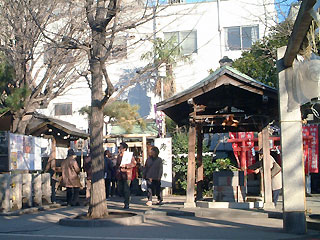 All
of the lucky gods offer prosperity, but each one also
has a special aspect he or she watches over.
All
of the lucky gods offer prosperity, but each one also
has a special aspect he or she watches over. 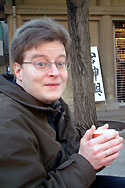 Jurojin
carries the secret to longevity in a scroll. He usually
wears a scholar's cap and has a long white beard and a
staff.
Jurojin
carries the secret to longevity in a scroll. He usually
wears a scholar's cap and has a long white beard and a
staff.
At this shrine, there was a long line of people carrying big white envelopes that said "Fukugawa Shichifukujin Meguri" on them. We got in line there and paid our respects to Jurojin by bowing and clapping. I think he most appreciated the coins we tossed into his offerings box.
We looked around for the place that was selling the envelopes, but couldn't find it. There were plenty of trinkets and things on sale, so we settled for an omikuji, a fortune, and some amazake, sweetened sake with rice floating in it. The amazake wasn't quite ready, so the vendor gave us each a mikan, mandarin orange, to eat while we waited. We considered having a cup at each shrine--sort of a spiritual pub crawl--but ended up with one here and one at the last shrine.
My omikuji was #47 - chuu kichi, middle luck. You can get a range from great misfortune (dai kyou) to great luck (dai kichi) so middle luck isn't too bad. Tod got dai kichi - great luck.
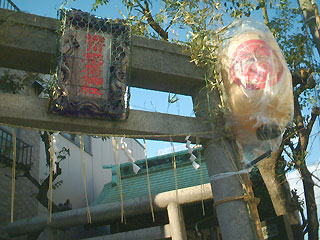 After
finishing our amazake, we headed toward the next
shrine. Along the way, I realised I really didn't need
my map. The route
After
finishing our amazake, we headed toward the next
shrine. Along the way, I realised I really didn't need
my map. The route 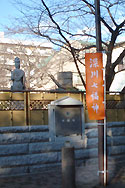 was
marked with bright orange banners! The map was helpful
anyway, to give an idea of the distance, but it was possible
to put it away and just follow the banners.
was
marked with bright orange banners! The map was helpful
anyway, to give an idea of the distance, but it was possible
to put it away and just follow the banners.
They lead us to a small inari jinga on the corner of a small street. This is where Hotei is enshrined. Officially, Hotei embodies happiness (and prosperity) but I think of him as the god of hospitality. Whether that's because his name looks like 'hotel' or because there is a company in Tokyo called Hotei Wines, I'm not sure.
Hotei is usually shown sitting down, fat and laughing. He is the model for the "laughing Buddha" that is so popular in the US. Hotei is the Japanese name of the eccentric Zen priest, Pu Tai, who wandered around China with a cloth sack over one shoulder. Hotei is sometimes shown with a cloth sack containing riches.
There were no omikuji to be had here, so after offering our respects, we headed back to the street and followed the banners.
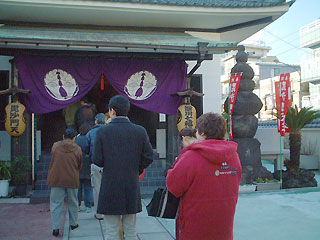 Bishamonten
scares the crap out of me. He's the protector of righteousness.
He wears armor, carries weapons, and has a fearsome glare
in his eyes. Does righteousness really have to be so scary?
Bishamonten
scares the crap out of me. He's the protector of righteousness.
He wears armor, carries weapons, and has a fearsome glare
in his eyes. Does righteousness really have to be so scary?
I lost a little of my fear when I fell into line behind the woman in the red coat. It's covered with Japlish on the back: Dog*O*Shop; Come on a DOS walk with me; DOS is our important friend. It was hard not to giggle.
But then it was our turn to pay our respects. Bishamonten standing inside the shrine was staring down at me, daring me to be unrighteous. I smiled, bowed and drop him a hefty donation before fleeing down the stairs. Wrath of god, indeed.
I bought an omikuji and was delighted to discover that this one came with a special treat. Wrapped up in a slip of gold-flecked paper was a tiny Bishamonten charm. He doesn't look quite so frightening when he's scaled down to 2 centimeters, so I'll put him on my desk and hope he draws in some righteousness for me this year. The omikuji was #30, another chuu kichi. Tod picked up a kichi, but with a kanji we didn't know. When he looked it up later, it means lowest. So lucky, but not too lucky.
 At
midnight on New Year's Eve, we visited Daikokuten
in our own neighborhood. Now were were going for a second
visit. I'm not sure if that brings us more attention and
luck, but I hope so. Daikokuten looks after food. Back
in India, he fights evil but here in Japan, he watches
over the kitchen and harvests
At
midnight on New Year's Eve, we visited Daikokuten
in our own neighborhood. Now were were going for a second
visit. I'm not sure if that brings us more attention and
luck, but I hope so. Daikokuten looks after food. Back
in India, he fights evil but here in Japan, he watches
over the kitchen and harvests
Daikokuten is easy to recognise. He's one of three short, fat guys in the pantheon of lucky gods and he's the only one who carries a mallet. It's a magical wish-granting mallet. In his other hand he usually has a bag of riches and he's almost always standing on top of rice bales.
In front of us in line was a woman with two terriers. Sort of a compliment of the DOS coat woman from the previous shrine. The dogs were nattily dressed in little sweaters with sports motifs. One was Baseball with bats and balls and doggy bones, and the other was sports of all kinds. I don't understand the desire to put dogs in sweaters, but it's very popular here. Fodder for another essay, perhaps.
Daikokuten's shrine was full of foodstuffs. And the omikuji system was a little different here. I worry that I did it wrong. At the other places, you went off to the side to purchase your omikuji. There was a bin or a basket for your 100 yen coin, and you pulled a slip out. But here, the omikuji were right along side the offering box. Since we'd each tossed in 100 yen, we took an omikuji, but I wonder if we weren't supposed to put in an extra 100 yen...
My omikuji was #23 - kichi - luck, which is the same as chuu kichi. On New Year's Eve, I got a han kichi - half luck. So maybe combined I'll get 3/4 luck in the kitchen this year. Tod's two omikuji from Daikokuten were kichi and dai kichi. If you're coming over for dinner, be sure Tod's manning the kitchen.
When we left Daikokuten's shrine, we couldn't find the route flags to lead us. So I pulled out the map and noted that the closest shrine was about 6 blocks away and around the corner. But where was everyone else? Earlier we'd noticed that the other pilgrims seemed to be following the route in the opposite direction from us. They were coming from the shrines we were going to. Now we were all alone. Peculiar.
As we crossed over one of Koto-ku's many canal's we discovered our error--the flags were on the next bridge over! We detoured along a canal-side path to the other bridge and rejoined the proper route. Maybe that was a little silly, since we were about a block from the next shrine when we did that, but the marked path lead through the town's scenic areas. May as well make our pilgrimage pretty as well as prosperous.
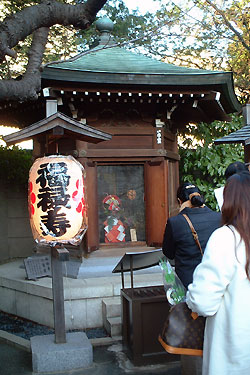 After our detour, we ended up here to visit Fukurokuju.
After our detour, we ended up here to visit Fukurokuju.
This pretty octagonal shrine, like some of the other shichifukujin shrines, is just a small side area that's part of a much larger temple or shrine. Buddhist temples have no problem mixing in Shinto shrines as part of their grounds, though I've never noticed Shinto shrines with Buddhist fixtures. Three of the lucky gods we visited were at Buddhist temples and four were at Shinto shrines. Fukurokuju is enshrined at a Buddhist temple, as were Daikokuten and scary Bishamonten. I don't know if these deities are specifically Buddhist or Shinto or whether they are claimed by both or neither.
Religion in Japan is not easily delineated for the layman. I'm sure if you are a priest or a faithful follower it is all clear and obvious. I'm at the level of ignorance where I can confidently say that Buddhist ceremonies are for sad occasions, Shinto for happy ones. And I know that Shinto shrines have torii gates and the pretty bead rosaries are Buddhist. Beyond that, I'm guessing.
Fukurokuju carries a scroll containing the world's wisdom. He's also associated with longevity, like Jurojin. They are both depicted as old men with flowing white beards, but Fukurokuju is bald and has a very tall forehead. An egghead deity!
Although his name, Fukurokuju, has kanji that mean "luck amount longevity" I think it's interesting that the sound of the name, fuku-roku-ju could also mean "lucky 60." The 12 year, 5 element cycle of the zodiac (2003 is the year of the metal sheep) means that it takes 60 years to go around once. When you reach your 60th birthday, you've seen it all--and have achieved wisdom and long life.
Although there were no omikuji to be had here, we later picked up an all-purpose shichifukujin omikuji from a big Buddhist temple that wasn't part of our meguri. These special omikuji came with gold-plated charms and mine was Fukurokuju. The omikuji was just shou kichi, little luck, so maybe I'll only be a little bit wise this year. As long as I'm not a little more of a wiseass than usual, I guess I'll take what I can get.
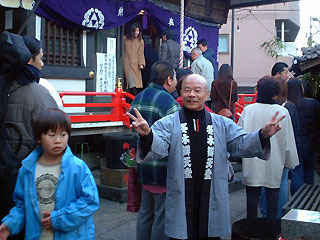 Next we were on
our way to the shrine we detoured away from earlier. Benzaiten,
also known as Benten, is one of my favorite of the shichifukujin
because she is the only goddess among them. I wholeheartedly
support women in power. Not only is she the only woman,
but she's also patron of the arts and sciences, literature,
and virtue.
Next we were on
our way to the shrine we detoured away from earlier. Benzaiten,
also known as Benten, is one of my favorite of the shichifukujin
because she is the only goddess among them. I wholeheartedly
support women in power. Not only is she the only woman,
but she's also patron of the arts and sciences, literature,
and virtue.
Inside her shrine she sat leafed in gold and looking lovely playing her biwa (a Japanese lute not the biwa fruit that's known as kumquat in English). Her interior decorator had gone overboard with flowers, gold lotuses, cushions in rich colors and offerings of fruit, sake and rice. Benten has a cozy home at this shrine. Very inviting. I might have crawled in and played the lute myself except for the long line of other people wishing to pay their respects. And my lack of lute-playing ability...
My omikuji was #47 again (just like Jurojin) -- chuu kichi. I also purchased a little gold Benzaiten charm to go with Bishamonten and Fukurokuju. Tod got dai kichi from Benten, so he'll be prospering in the arts and sciences this year.
I hoped to get a photo of me at this shrine but this nice man offered to take a picture of Tod and me together. However, my camera is not friendly to others and he didn't actually get the shot. So instead, I took a picture of him. He was funny and did the classic "V for victory" that everyone does in photos here.
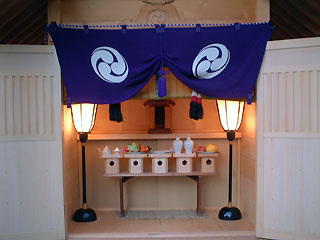 If
you've been counting your way through this essay, then
you know we're up to the last god on our pilgrimage. He
is Ebisu--the same name as the Yamanote
line station. Ebisu guards over occupations and is also
a deity of rice paddies and fishing. He's easy to spot
because he carries a fish and instead of a staff, he's
got a fishing pole. For a god of careers, he's got a surprising
leisure theme going on. At least in this day and age...
If
you've been counting your way through this essay, then
you know we're up to the last god on our pilgrimage. He
is Ebisu--the same name as the Yamanote
line station. Ebisu guards over occupations and is also
a deity of rice paddies and fishing. He's easy to spot
because he carries a fish and instead of a staff, he's
got a fishing pole. For a god of careers, he's got a surprising
leisure theme going on. At least in this day and age...
We actually took a wrong turn on the way there, despite the banners and our map, and ended up at the Buddhist temple next door to Ebisu's shrine. We were distracted by the festival at the temple--rows of brightly colored stalls selling food and games--and completely missed the signs across the street saying "Ebisu this way."
But we went into a temple that was lovely and very rich and that's where we got our all-purpose shichifukujin omikuji. Mine came with a Fukurokuju charm, as I mentioned. Tod's charm was Jurojin and his omikuji was han kichi. But there was no shrine to Ebisu in sight, so I consulted the map and realised my error. We walked back through the festival, I played a game of spinning darts and we crossed the street to our final destination.
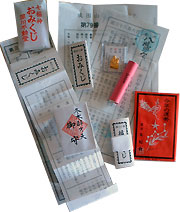 Ebisu's
shrine is newly rebuilt. We were reaching the end of the
worshipping day (temples and shrines close at 5 pm) and
not so many other people were around so I got a nice clear
picture of it. Where Benten's shrine was cluttered with
all sorts of decorations, Ebisu's was spare and tidy.
Extremely calming.
Ebisu's
shrine is newly rebuilt. We were reaching the end of the
worshipping day (temples and shrines close at 5 pm) and
not so many other people were around so I got a nice clear
picture of it. Where Benten's shrine was cluttered with
all sorts of decorations, Ebisu's was spare and tidy.
Extremely calming.
I finally got a dai kichi omikuji so I am looking forward to a very lucky year in my work. Tod's was only small luck.
In addition to our omikuji, we bought birthday fortunes in bright red packets. These are horoscopes and they're really long, so I've only read a little bit of mine. As these things always do, the profile part says I'm a bossy leader who thinks only of herself. So true. The other part, my horoscope for the year, is divided into four sections (wishes, relationship, money and career) but I can't read enough of it without the dictionary at hand.
So if you've been keeping track, it looks like I'm in for a pretty steady middle luck year but Tod's going to have a wild ride with big luck in some areas and little luck in others. Neither of us got any kyou (misfortune) omikuji. Whew.
Kristen |
Tod |
|
Jurojin |
middle |
big/half |
Hotei |
-- |
-- |
Bishamonten |
middle |
small |
Daikokuten |
half/middle |
middle/big |
Fukurokuju |
small |
-- |
Benzaiten |
middle |
big |
Ebisu |
big |
small |